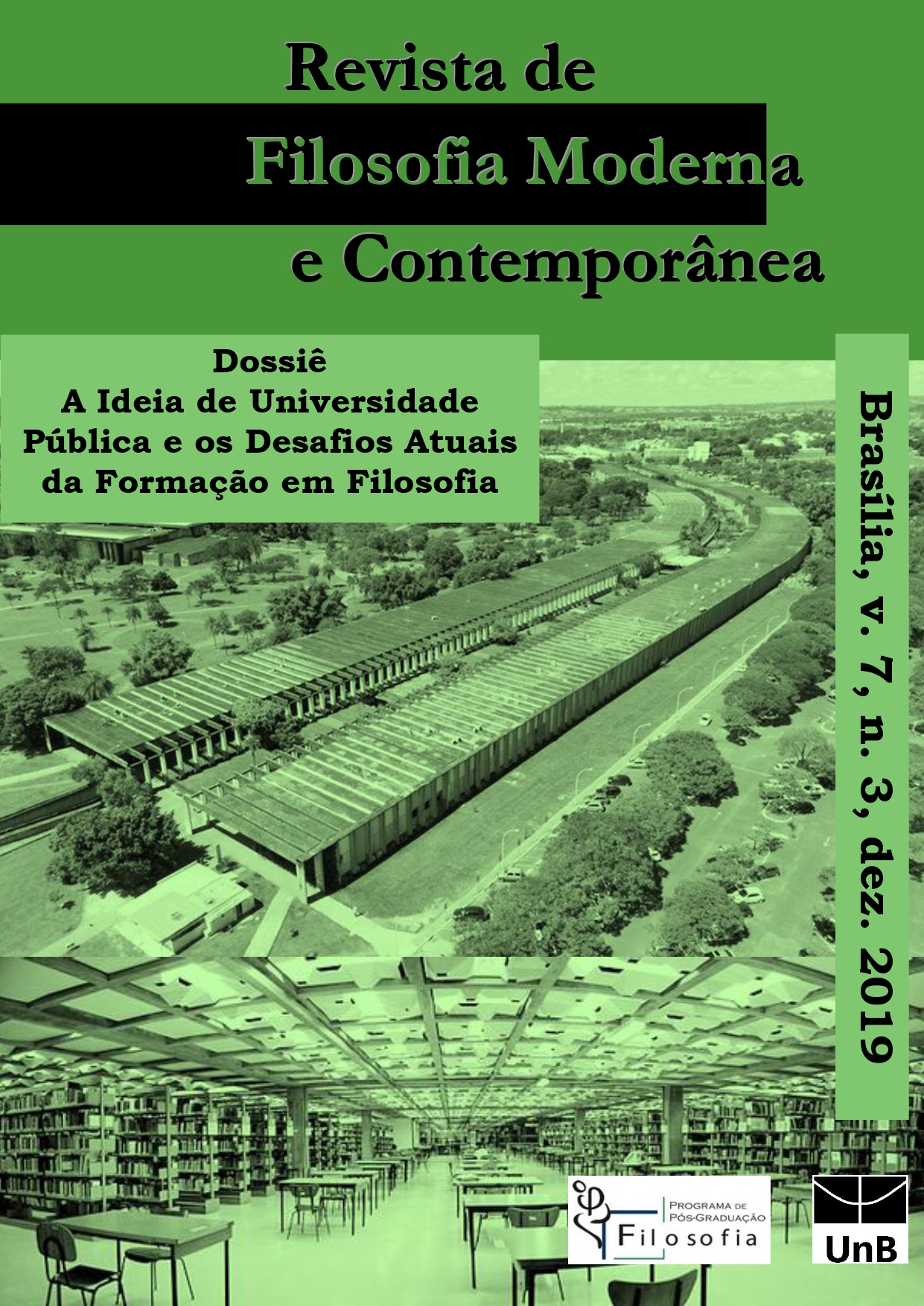Notes on Translatability, Pedagogy and Hegemony in A. Gramsci's Notebooks
DOI:
https://doi.org/10.26512/rfmc.v7i3.29301Keywords:
translatability, hegemony, pedagogy, Lenin, GramsciAbstract
In this article, I am presenting some reflections on one of the main sources of the relationship between the concepts of “hegemony”, “pedagogy” and “translatability” in Antonio Gramsci’s Prison Notebooks. In particular, I shall focus on the post-1917 Lenin, who stressed the role played by “culture” and “pedagogy” in the construction of the new Russian economy, politics, and society. I shall also deal with some important points that Gramsci develops on the grounds of his own reflection on Lenin’s work during this post-1917 historical phase, especially with the relationship between translatability, “translation”, political hegemony and pedagogy. The following pages are consciously and necessarily conceived as a limited intervention, which will require further integration in the future.
Obrigado pela trad,. Do abstract. Como vivi nos EUA 8 anos,atrevi fazer correções leves . By the way: “I present” in inglese si riferisce a una azione ripetuta quotidianamente, etc...
Downloads
References
BARATTA, G. Le rose e i quaderni. Roma: Carocci, 2003.
BOOTHMAN, D., Traducibilità e processi traduttivi. Un caso: A. Gramsci linguista. Perugia: Guerra Edizioni, 2004.
CATONE, A. Bordiga. In: LIGUORI, G.; VOZA, P. (Orgs.). Dizionario Gramsciano 1926-1937. Roma: Carocci, 2009.
CARLUCCI, A. Gramsci and Languages. Unification, Diversity, Hegemony. Leiden-Boston: Brill, 2014.
CROCE, B. Estetica come scienza dell'espressione e linguistica generale. Bari: Laterza, 1922.
FREIRE, P. Pedagogia da indignação: cartas pedagógicas e outros escritos. São Paulo: UNESP, 2000.
FROSINI, F. La religione dell’uomo moderno. Roma: Carocci, 2010.
______ Gramsci e la filosofia. Roma: Carocci, 2003.
GIASI, F. Gramsci a Vienna. Annotazioni su quattro lettere inedite. In: GIASI, F.;, GUALTIERI, R.;, PONS, S. (Orgs.). Pensare la politica. Scritti per Giuseppe Vacca. Roma: Carocci, 2009.
GRAMSCI, A. Quaderni del carcere. V. GERRATANA (Org.). Torino: Einaudi, 1975.
______ Lettere dal carcere. CAPRIOGLIO, S.; FUBINI, E. (Orgs.). Torino: Einaudi, 1965.
IVES, P. Gramsci’'s Politics of Language: Engaging the Bakhtin Circle and the Frankfurt School. Toronto: University of Toronto Press, 2004.
______ Language and Hegemony in Gramsci. London and Ann Arbor (MI): Pluto Press, 2004.
IVES, P.; LACORTE, R. Gramsci, language, and translation. Lanham: Lexington Books, 2010.
LACORTE, R. “Sulla presenza dei concetti di 'traducibilità ,', 'lingua' e 'rivoluzione passiva' di Antonio Gramsci in Petrolio di Pier Paolo Pasolini”. In: MAGGI, A.; WEST, R. (Orgs.). “Scrittori inconvenienti”., Ravenna: Longo Editore, 2009.
______ “Translatability, language and freedom in Gramsci's Prison Notebooks”. In: IVES, P.; LACORTE, R. (Orgs.). In: Gramsci, language, and translation. Lanham: Lexington Books, 2010.
______ “Espressione e traducibilità nei Quaderni del carcere”. In: DURANTE, L.; LIGUORI, G. (Orgs.). Domande dal presente. Studi su Grasmci. Roma: Carocci, 2012.
_______ “‘Sobre alguns aspectos da ‘tradutibilidade’ nos Cadernos do cárcere de Antonio Gramsci e algumas das suas implicações.”.’ In: Revista Educação e Filosofia. Uberlândia: Editora UFU, 2014, p. 59-98.
_____ Personalidade, linguagem e política nos Cadernos de A. Gramsci. Apontamentos. In: Ontologia trabalho e formação humana, Adauto Lopes da Silva Filho; - Fátima Maria Nobre Lopes; - Francisco José Lima Sales (Orgs.). Fortaleza: Editora CRV, 2018, p. 231-280.
LENIN, V. I. Opere scelte. Roma: Editori Riuniti, 1968.
LIGUORI, G.; VOZA, P. (Orgs.). Dizionario Gramsciano 1926-1937. Roma: Carocci, 2009.
LO PIPARO, F. Lingua intellettuali egemonia in Gramsci. Roma-Bari: Laterza, 1979.
_____ “Gramsci and Wittgenstein. An intriguing connection”. In: CAPONE, A. (Org.). Perspectives on language use and pragmatics. München: Lincom, 2010, p. 285-320.
MANACORDA, M. A. Il marxismo e l’educazione. Roma: Armando Armando Editore, 1964.
MARX, K. (1845a) The Holy Family. In: Marx/Engels Selected Works, 1, Moscow: Progress Publishers, 1969.
_____ (1845b) Theses on Feuerbach. In: Marx/Engels Selected Works, 1, Moscow: Progress Publishers, 1969, p. 13-15.
MATUOKA, I. “Por que o Escola Sem Partido vai contra o papel da escola”, 24/05/2018. Disponível em: https://educacaointegral.org.br/reportagens/por-que-o-escola-sem-partido-vai-contra-o-papel-da-escola/, acessado em [12/11/2019].
OTAÅ EVIĆ, A. “Cambiamenti di regime chiavi in mano”. In: Le Monde Diplomatique/Il Manifesto. Roma: Novembro 2019, p. 1 e 18-19.
PRESTIPINO, G. “Dialettica”. In: Le parole di Gramsci. Roma: Carocci, 2004.
SCHIRRU, G. “La categoria di egemonia e il pensiero linguistico di Antonio Gramsci”. In: Egemonie, Dd’ORSI, A. (Org.). Napoli: Dante & Descartes, 2008.
TOGLIATTI, P. “La formazione del gruppo dirigente del Partito comunista italiano nel 1923-1924” (1962). Roma: Editori Riuniti, 1971.
VACCA, G. Appuntamenti con Gramsci. Introduzione allo studio dei Quaderni del carcere., Roma: Carocci, 1999.
Downloads
Published
How to Cite
Issue
Section
License
Copyright for articles published in this journal is retained by the authors, with first publication rights granted to the journal. By virtue of their appearance in this open access journal, articles are free to use, with proper attribution, in educational and other non-commercial settings.


